
Wu Zetian, alternatively named Wu Zhao, Wu Hou, during the later Tang dynasty as Tian Hou, in English as Empress Consort Wu or by the deprecated term "Empress Wu", was a Chinese sovereign who ruled unofficially as empress consort and empress dowager and officially as empress regnant (皇帝) during the brief Zhou dynasty, which interrupted the Tang dynasty. Wu was the sole officially recognized empress regnant of China in more than two millennia.

Su Shi, courtesy name Zizhan,, art name Dongpo, was a Chinese writer, poet, painter, calligrapher, pharmacologist, gastronome, and a statesman of the Song dynasty. A major personality of the Song era, Su was an important figure in Song Dynasty politics, aligning himself with Sima Guang and others, against the New Policy party led by Wang Anshi.
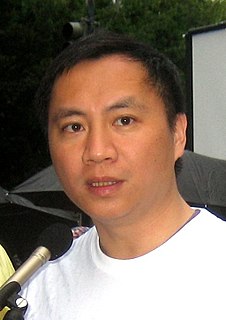
Wang Dan is a leader of the Chinese democracy movement and was one of the most visible student leaders in the Tiananmen Square protests of 1989. He holds a Ph.D. in history from Harvard University, and from August 2009 to February 2010, Wang taught cross-strait history at Taiwan's National Chengchi University, as a visiting scholar.

Sun Fo or Sun Ke, courtesy name Zhesheng (哲生), was a high-ranking official in the government of the Republic of China. He was the son of Sun Yat-sen, the founder of the Republic of China, and his first wife Lu Muzhen.
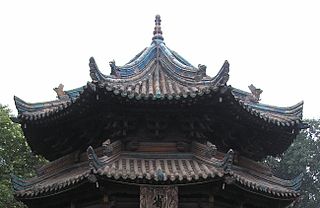
The Utsuls or Hainan Hui, are a Chamic-speaking ethnic group which lives on the island of Hainan, and are considered one of the People's Republic of China's unrecognized ethnic groups. They are found on the southernmost tip of Hainan near the city of Sanya.

The Wang Jingwei regime is the common name of the Reorganized National Government of the Republic of China, a puppet state of the Empire of Japan, located in eastern China. This should not be confused with the Republic of China under Chiang Kai-shek, which was a separate, non-Japanese government. It was ruled by a one-party totalitarian dictatorship under Wang Jingwei, an ex-Kuomintang (KMT) official. The region that it would administer was initially seized by Japan throughout the late 1930s with the beginning of the Second Sino-Japanese War. Wang, a rival of Chiang Kai-shek and member of the pro-peace faction of the KMT, defected to the Japanese side and formed a collaborationist government in occupied Nanjing in 1940. The new state claimed the entirety of China during its existence, portraying itself as the legitimate inheritors of the Xinhai Revolution and Sun Yat-sen's legacy as opposed to Chiang Kai-shek's government in Chongqing, but effectively only Japanese-occupied territory was under its direct control. Its international recognition was limited to other members of the Anti-Comintern Pact, which it was a signatory of. The Reorganized National Government existed until the end of World War II and the surrender of Japan in August 1945, at which point the regime was dissolved and many of its leading members were executed for treason.
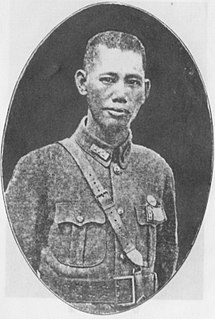
Cai Tingkai was a Chinese general.

The Chinese men's national basketball team represents the People's Republic of China and is governed by the Chinese Basketball Association (CBA). Based on the number of tournament titles, China is considered a major basketball powerhouse in Asia and has by far the most successful basketball program on the continent.

The Fujian People's Government is the common name for the People's Revolutionary Government of the Republic of China (1933–1934), also known as the Fujian People's Government, was a short-lived anti-Kuomintang government in the Republic of China's Fujian Province. The rebellion that led to its formation and its collapse are known as the Fujian Incident or Fujian Rebellion.
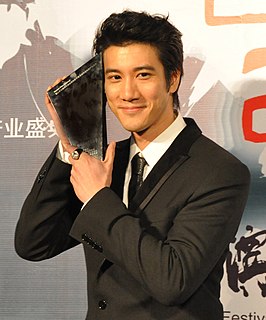
Wang Leehom, sometimes credited as Leehom Wang, is a Chinese-American singer-songwriter, actor, producer, and film director. Formally trained at the Eastman School of Music, Williams College and Berklee College of Music, his musical style is known for fusing Chinese elements with hip-hop and R&B. Wang debuted in 1995 and since then has released over 25 albums, with sales of over 50 million copies. He is also a four-time winner and 19-time nominee of Taiwan's Golden Melody Awards, the "Grammys" of Chinese music. His sold-out concert at the 90,000 seat Beijing Bird's Nest on April 14, 2012 was the first solo pop concert to be held at the iconic venue. He holds honorary doctoral degrees from both Williams College and Berklee. With over 60 million followers on social media, he is one of the most followed celebrities in China.
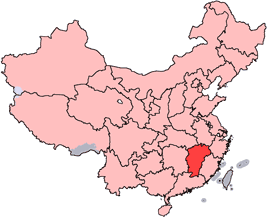
The Second Encirclement Campaignagainst Jiangxi Soviet was a series of battles launched by the Chinese Nationalist Government in the hope of encircling and destroying the Jiangxi Soviet after the previous campaign had failed. The Red Army repelled the encirclement by launching their Second Counter-Encirclement Campaign, also called by the communists as the Second Counter-Encirclement Campaign at Central Revolutionary Base, in which the local Chinese Red Army successfully defended the Jiangxi Soviet against the Nationalist attacks from April 1, 1931, to May 31, 1931.

The Third Encirclement Campaignagainst Jiangxi Soviet was the third campaign launched by the Chinese Nationalist Government in the hope of destroying the Red Army in Jiangxi. It was launched less than a month after the previous campaign failed. However, this encirclement was repelled by the Red Army's Third Counter Encirclement Campaign at the Central Soviet, also called as the Third Counter-Encirclement Campaign at the Central Revolutionary Base.

Wang Yang is a Chinese politician. He is a member of the Politburo Standing Committee, and Chairman of the Chinese People's Political Consultative Conference. Wang was one of the four Vice Premiers of China in Premier Li Keqiang's Government between 2013 and 2018. Until December 2012, he served as the Communist Party Secretary of Guangdong; the southern Chinese province's top office. He served as the party secretary of Chongqing, an interior municipality, from 2005 to 2007. Wang also held a seat on the Politburo of the Communist Party of China beginning in 2007.
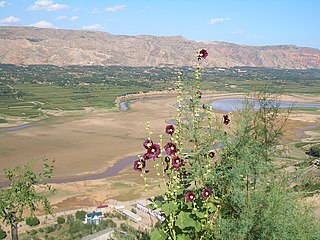
Dongxiang Autonomous County is an Autonomous County in the Linxia Hui Autonomous Prefecture, province of Gansu of the People's Republic of China. With ethnic minority of the Dongxiang.

Caught in the Web is a 2012 Chinese drama film directed by Chen Kaige. In September 2012 it screened as a special presentation at the 2012 Toronto International Film Festival. The film was selected as the Chinese entry for the Best Foreign Language Oscar at the 85th Academy Awards, but it did not make the final shortlist.

Xu Song 徐松 (1781–1848) was a Chinese official exiled to Central Asia during the period of the military governorship of Xinjiang of Songyun. He was prominent with Wang Tingkai and Qi Yunshi among the officials employed by Songyun to compile his gazetteer of Xinjiang.

Love O2O is a 2016 Chinese romance film directed by Zhao Tianyu and starring Angelababy and Jing Boran. It is based on the novel of the same name by Gu Man. It was released in China on August 12, 2016.
The Historical Status of China's Tibet is a book published in 1997 in English by China Intercontinental Press, the propaganda press for the government of the People's Republic of China.The book presents the Chinese government's official position on the history of Tibet and claims that Tibet has been under the sovereignty of China since the Yuan dynasty.
















